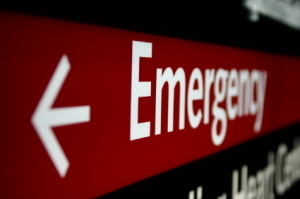NIMH Funding Study to Identify, Reduce Suicide in ER Patients
by
Astrid Fiano, DOTmed News Writer | February 15, 2010

NIMH focus on ER
The National Institute of Mental Health is funding a grant to increase suicide detection and prevention in emergency room patients who present suicide risk factors. The NIMH says the study will begin in June 2010, in eight different sites in the nation, and should enroll around 1,420 participants over five years. The study is called the Emergency Department Safety Assessment and Follow-up Evaluation (EDSAFE) trial, and will be coordinated by the Emergency Medicine Network EMNet, which is based at Massachusetts General Hospital.
According to an NIMH press release, the EDSAFE will be conducted in three phases. In the first phase, "treatment as usual (TAU)" for patients will be assessed. The NIMH says TAU is usually evaluating suicidal risk in ER patients who have psychiatric risk factors such as depression, suicidal thinking or behavior (ideation), or substance abuse. Such patients may be put under observation and evaluated by a mental health provider, or referred to a mental health professional outside the hospital. However, follow-up care is often inadequate. In the second phase, a universal screening process will be tested in which all patients, regardless of whether they exhibit the typical risk factors for suicide, will be screened for suicidal ideation. The researchers will then compare the universal screening with TAU to determine how well each process detects suicidal patients.
The third phase will involve more intensive intervention, including screening, brief counseling, an evaluation by a mental health provider, referral to outpatient care and other aspects. The more intensive intervention will then be compared to TAU and to universal screening.
Dr. Edwin D. Boudreaux, Ph.D., of the University of Massachusetts, is the leader of the team of researchers. He commented on the project to DOTmed. Dr. Boudreaux stated that some of the goals of this new research are "to develop better methods for identifying suicidality in ER settings and to create better strategies for managing it when suicidality is identified."
Dr. Boudreaux then explained the importance of hospital ERs in suicide prevention. "Many people are treated in ERs for suicide attempts or for suicidal ideation. In addition, we know that many people who present to ERs for other, non-suicide reasons are suicidal but medical providers just don't know it. For these reasons, it is a logical setting to introduce screening and interventions.
When asked if suicide prevention is receiving more attention now as part of a larger focus on mental health issues, Dr. Boudreaux said, "I'm not sure, but it's possible. Suicide is certainly a serious facet of many mental health diagnoses, ranging from depression to schizophrenia, that is both important and preventable."
The other researchers on the project are Carlos A. Camargo, Jr., M.D., DrPH, of Massachusetts General Hospital and Harvard Medical School, and Ivan Miller, Ph.D., of Butler Hospital in Providence, RI.
Adapted in part from an NIMH press release.
Read more on the grant at: http://www.nimh.nih.gov/science-news/2010/new-grant-aims-to-identify-and-reduce-suicide-among-emergency-department-patients.shtml?WT.mc_id=rss
